5 Healthy Coffee Additives to Try
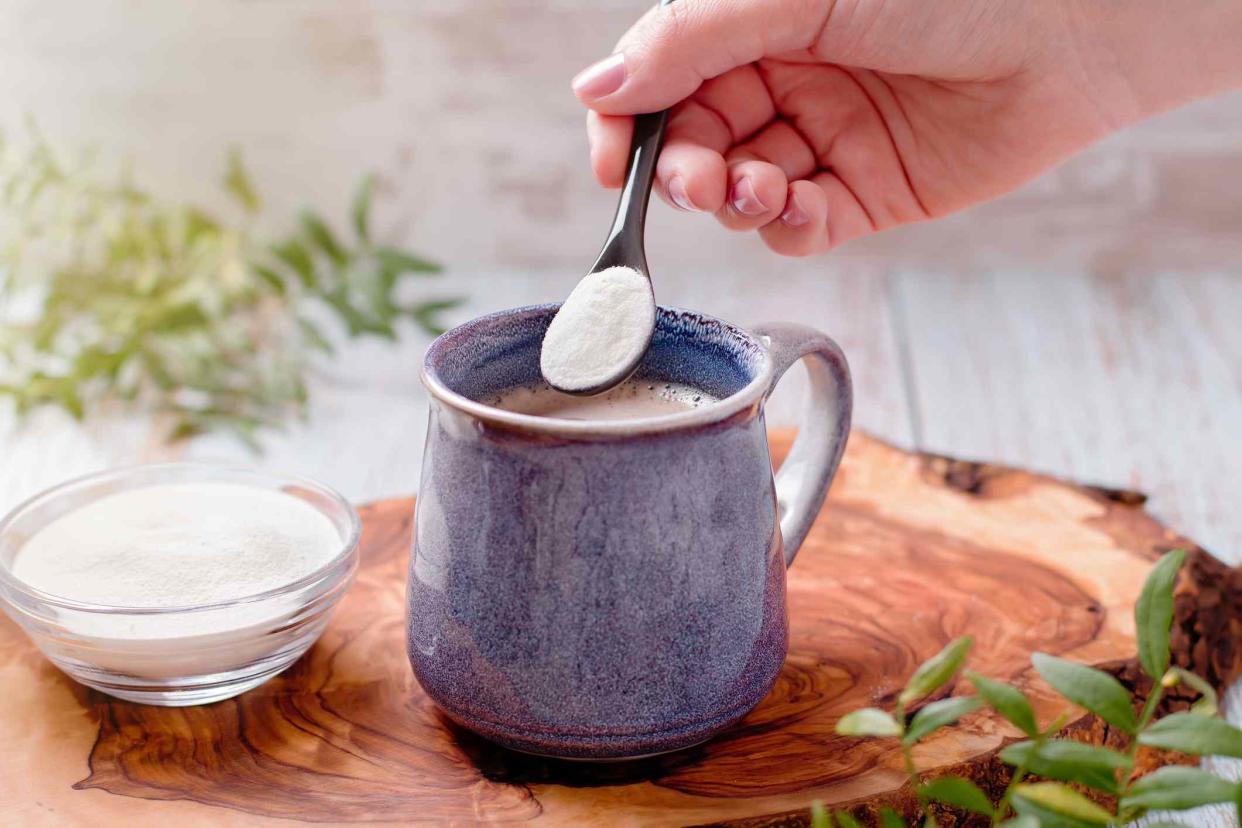
Beo88 / Getty Images
Medically reviewed by Aviv Joshua, MS
Coffee is one of the most popular beverages in the world, and up to 85% of Americans drink it daily. While coffee consumption is linked to significant health benefits, such as a reduced risk of liver disease, heart disease, type 2 diabetes, and certain cancers, many people add ingredients to their coffee that may counteract some of this popular brew’s positive effects on the body.
For example, many coffee additives, such as flavored creamers and coffee syrups, are high in added sugar and pack significant calories, which can negatively impact blood sugar, body weight, and more.
Fortunately, many nutritious, health-promoting ingredients, such as spices, collagen, and sugar alternatives, can add major benefits to your cup of joe.
Here are 5 healthy additives to try in your coffee.
1. Collagen Peptides
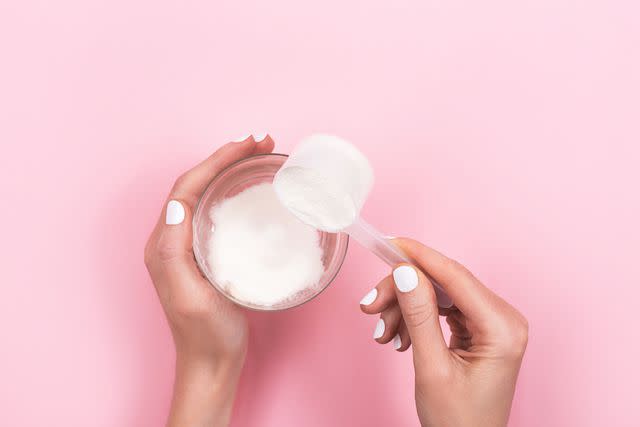
Yulia Lisitsa
If you’re looking for an easy way to boost your protein intake, consider adding collagen peptides to your coffee. Collagen peptides are highly absorbable chains of amino acids derived from animal proteins, such as beef, poultry, and seafood. They are a convenient way to increase your protein intake as they can be added to hot and cold beverages, like hot and iced coffee.
Most collagen peptide products contain between 10 and 18 grams of protein per scoop, which can help you meet your daily protein needs. Plus, consuming collagen has been shown to benefit health in several ways. For example, studies show that regularly consuming collagen peptides may improve bone density and joint health, increase muscle mass, and improve the health and appearance of the skin.
Collagen is a perfect way to boost the health benefits of your coffee as it’s easy to use and comes in a variety of flavors, many of which are sweetened with zero-calorie sugar alternatives, like stevia and monk fruit.
2. Cinnamon

Helen Camacaro / Getty Images
Cinnamon has a warm and spicy flavor that pairs well with coffee’s rich, slightly bitter taste.
Adding a dash of cinnamon to your coffee may help you cut back on the amount of sugar you use in your cup of joe. Plus, cinnamon has been shown to promote healthy blood sugar levels and may be beneficial for those with diabetes and pre-diabetes.
Cinnamon is also packed with antioxidant and anti-inflammatory compounds such as coumarin, cinnamic acid, eugenol, and cinnamaldehyde, which can help support overall health by reducing inflammation and enhancing the body’s natural antioxidant defenses.
Try sprinkling cinnamon into black coffee or adding a dash of cinnamon to lattes and cappuccinos for a sugar-free way to kick up the flavor of coffee drinks.
Related: 10 Medications You Should Never Mix With Coffee
3. Monk Fruit Sweetener
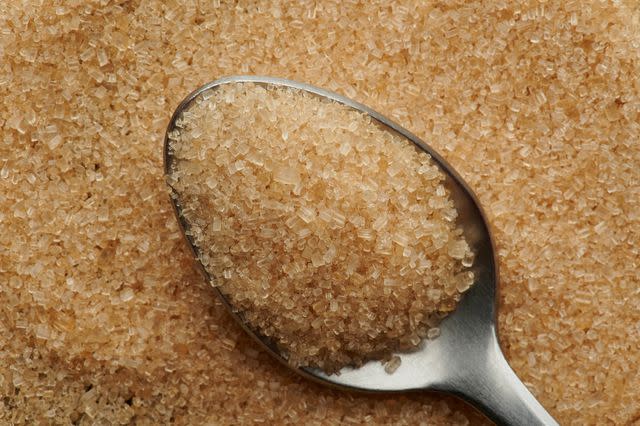
dimarik / Getty Images
Reducing added sugar intake is essential for promoting health and longevity. High-sugar diets have been linked to health risks like fatty liver, weight gain, and heart disease. Monk fruit, also known as Luo Han Guo, is a sweetener derived from the fruit of the Siraitia grosvenorii plant. It's 300 times sweeter than sucrose or table sugar, but it’s calorie-free and doesn’t affect blood sugar levels.
Unlike many artificial sweeteners like aspartame, monk fruit doesn’t have an unpleasant aftertaste and isn’t associated with health risks. It's generally recognized as safe (GRAS) by the U.S. Food and Drug Administration (FDA), which means the sweetener has been shown to be safe for its intended use in food.
Monk fruit comes in a variety of forms, including liquid drops and granulated products. You can also try monk fruit-sweetened creamers and collagen products if you like a creamier coffee drink.
Some monk fruit products contain erythritol, a sugar alcohol linked to health concerns, so always read product nutrition labels. Some research shows that regularly consuming erythritol may increase the risk of heart attack, blood clots, stroke, and even death in people who are at an elevated risk of developing heart disease.
4. Cacao Powder
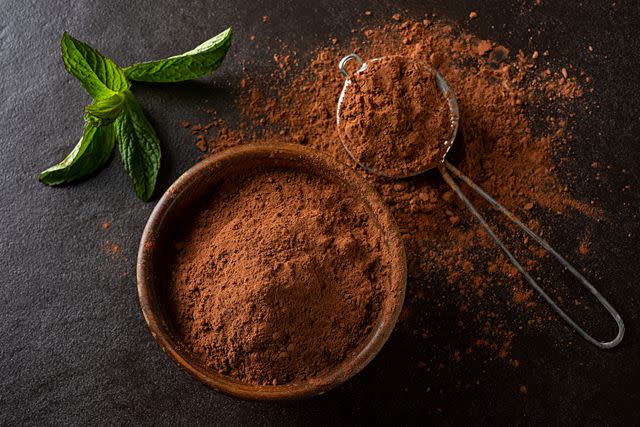
BURCU ATALAY TANKUT / Getty Images
Cacao powder is a nutrient-rich product derived from the beans of the Theobroma cacao tree, commonly known as the cacao or cocoa tree.
Cacao powder goes through less processing than cocoa powder and has a richer, more intense taste. Cacao powder is packed with protective plant compounds and is one of the best sources of flavonoid antioxidants you can eat. Cacao flavonoids like catechins, anthocyanins, and proanthocyanidins benefit health by reducing inflammation, protecting against cellular damage, and supporting cardiovascular function.
In addition to antioxidant and anti-inflammatory compounds, cocoa is high in nutrients necessary for healthy blood pressure regulation, such as magnesium and potassium, making cacao powder an excellent choice for supporting heart health.
Cacao can be added to black coffee or mixed into coffee drinks like lattes and cappuccinos. To make a healthier version of a caffè mocha, try using cacao powder, unsweetened milk, espresso, and monk fruit for a sugar-free, antioxidant-rich beverage that’s sure to satisfy your chocolate cravings.
5. Ginger
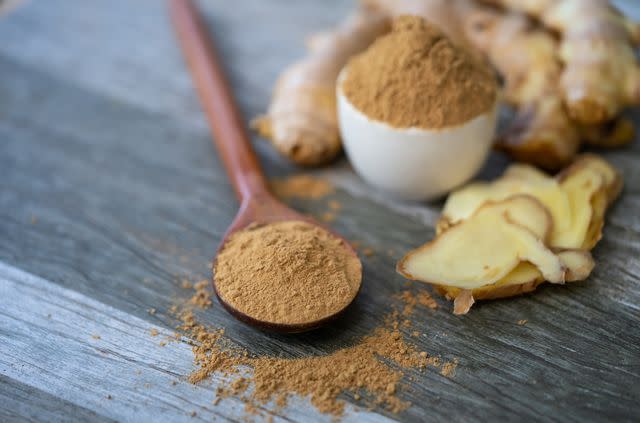
manusapon kasosod / Getty Images
Ginger is a root derived from the Zingiber officinale plant that has a variety of culinary and medicinal uses. Ginger contains over 100 active compounds, including shogaols, gingerols, and paradols, which have powerful health-promoting properties.
Study findings suggest that consuming ginger may positively affect blood sugar, blood lipid, and blood pressure levels and reduce inflammation in the body. Due to its powerful anti-inflammatory effects, regularly enjoying ginger may reduce the risk of inflammation-mediated conditions such as type 2 diabetes, heart disease, and certain cancers.
Like cinnamon, ginger has a warm and spicy flavor and is a popular additive in seasonal coffee drinks, like gingerbread lattes. To cut back on your added sugar intake, skip the gingerbread creamer and sugary flavored syrup and use powdered ginger root, monk fruit, and unsweetened milk of your choice to make a delicious, blood-sugar-friendly ginger latte.
How Much Caffeine Should You Have Per Day?
Caffeine is a stimulant found in coffee beans that’s responsible for coffee’s energy-enhancing effects. Caffeine is a central nervous system stimulant and increases alertness and focus by affecting neural activity in the brain.
Caffeine is associated with many benefits, such as reducing fatigue and enhancing exercise performance, but consuming too much can lead to adverse side effects. Try to keep caffeine intake to 400 milligrams (mg) or less daily—or about four cups of coffee. Exceeding this limit could result in symptoms like increased heart rate, irritability, insomnia, jitteriness, and nausea.
If you’re pregnant, limit caffeine to 200 mg per day or less. Higher amounts may increase the risk of complications such as low birth weight and increased risk of miscarriage.
Some people are more sensitive to the effects of caffeine than others, so assess your tolerance to caffeine and adjust your coffee intake if you experience any symptoms.
Other Ways to Boost Your Morning
In addition to reaching for healthier coffee additives, there are many other ways to elevate your morning routine to improve your overall health.
Here are some evidence-based tips for a better morning:
Get moving: Fitting in some movement early in the morning can help you start your day on the right foot. Regular exercise supports body weight maintenance, heart health, muscle growth, blood sugar regulation, and more. Try a brisk walk after enjoying your morning coffee.
Eat a healthy breakfast: Starting your day with a high-protein, high-fiber breakfast made with nutrient-dense ingredients can help provide your body with the energy it needs to tackle your day. Examples include a vegetable omelet with sliced avocado, Greek yogurt with seeds and berries, and overnight oats made with chia seeds, collagen, and sliced bananas.
Take some time for your mental health: Setting aside a few minutes for your mental health can make a big difference in the rest of your day. Meditating, journaling, and a quick yoga flow are just some examples of morning activities that can reduce anxiety and stress.
Developing a morning routine that includes movement, nutritious fuel, and mindfulness can support overall health and set you up for a more productive and happy day.
A Quick Review
Coffee offers major health benefits, but what you add to your coffee can make a difference. For example, popular coffee additives like flavored creamer and syrups are packed with added sugar, which can negatively affect health in several ways.
Fortunately, healthy additives like collagen, cinnamon, cacao, ginger, and monk fruit can enhance the flavor and health benefits of your coffee.
For more Health.com news, make sure to sign up for our newsletter!
Read the original article on Health.com.

